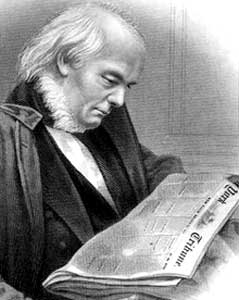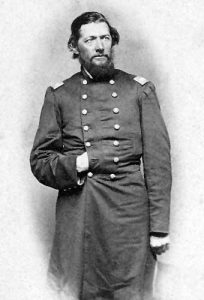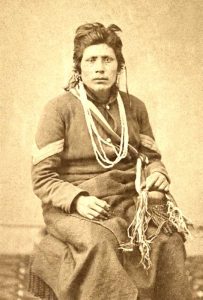William Addison Phillips was a journalist, lawyer, historian, member of Congress, and a Civil War Officer who helped to promote the Free-State cause in Kansas.
Phillips was born in Paisley, Scotland, on January 14, 1824. He received his early education in the public schools of his native city and graduated from the academy, where he made considerable progress in Latin and mathematics. Gifted with good memory and great acquisition powers, he was a “self-made man,” as all successful men must be, whatever their academic training. In 1839, at the age of 15, he came to America with his parents, who settled on a farm in Randolph County, Illinois. Here, he grew to manhood, sharing the hardships and privations incident to frontier life. When he reached manhood, he became associated with B.J.F. Hannah as editor of the Chester Herald. From 1852 to 1855, he was engaged in newspaper work while studying law and was admitted to the bar. While practicing law and editing his paper, he also acted as a correspondent for the New York Tribune.
In 1855, he came to Kansas and was officially appointed by Horace Greeley, a member of the editorial staff of the Tribune. Phillips traveled over a large part of the territory to find out the existing political situation for himself. His passionate letters to the Tribune created a sentiment in the north and east in favor of the anti-slavery movement in Kansas. A thorough anti-slavery man, his sympathies were entirely with the Free-State side. In the spring of 1856, he wrote and published his Conquest of Kansas, a campaign document for use during the presidential canvass. From the day of its publication, Phillips became a man of mark, and his name became identified with the great struggle against slavery. That same year, he was instrumental in establishing the Salina Road, which became well-known to travelers when no railroads were west of the Missouri River.

Horace Greeley and the New York Tribune.
In 1856, when Congress sent a committee to investigate the troubles in Kansas, Phillips could furnish the names of essential witnesses and materially assisted in the investigation. On account of his efforts in this direction, and because he was the correspondent of the greatest Free-State newspaper in the country, he became very unpopular with the “Law and Order League,” a name used by the border ruffians. He was compelled to seek safety several times between Leavenworth and Fort Leavenworth to escape from them, spending several nights in the brush. Phillips remained active in the free-state movement, and in the spring of 1858, Phillips and four associates founded the town of Salina, Kansas.
Shortly after the outbreak of the Civil War, he enlisted in the army and was commissioned as the major of the First Indian Regiment. Within a short time, he was promoted to the colonelcy of the famous Cherokee regiment and, for a time, commanded the Indian brigade. Under General Schofield, he commanded a division in the field, including Indians, cavalry, a battery, and regiments from different states. For nearly three years, he may be said to have had command of a separate army, varying from 3,500 to 8,000 men. He took part in most battles of the Southwest, was wounded three times, and had four horses killed under him in battle. When the war closed, he returned to Kansas. For years, he acted as an attorney for the Cherokee Indians and ably assisted in conserving their interests before the Interior Department in Washington.
In 1872, he was elected to Congress as a Republican and was re-elected for the three succeeding terms. While in Congress, he was a prominent committee member on public lands. This led him to study land systems and land tenure deeply. As a result of this study, he published a book, “Labor, Land, and Law,” which is regarded as an authority upon the subject. He died on Thanksgiving day, November 30, 1893, at the home of W.P. Ross at Fort Gibson, Oklahoma.
Compiled and edited by Kathy Alexander/Legends of Kansas, updated January 2025.
Also See:
Territorial Kansas & the Struggle for Statehood
See Sources.


